- DETERRENCE: Expeditionary Force 21, Forward and Ready, Now and in the Future
- DPRK: United States, Japan, Republic of Korea Defense Trilateral Talks Joint Statement
- GOVERNANCE AND CIVIL SOCIETY: China, S. Korea and Japan’s Environment Ministers Discuss Joint Response to Air Pollution
- CLIMATE CHANGE ADAPTATION: Stakeholder-Driven Research for Climate Adaptation in New York City
- ENERGY SECURITY: Power Hungry
- AUSTRAL PEACE AND SECURITY: Malcolm Fraser: An Unlikely Radical
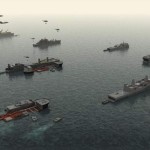 DETERRENCE: Expeditionary Force 21, Forward and Ready, Now and in the Future, 4 March 2014
DETERRENCE: Expeditionary Force 21, Forward and Ready, Now and in the Future, 4 March 2014
Driven by post Iraq-Afghanistan withdrawal pains and facing budget cuts, the US Marines wants a more agile, rapidly deployable force structure, integrated with the Navy, ceding long-term occupation to the Army, and a more flexible, lighter, faster vessels and equipment to support independent expeditionary operations in the face of “anti-access/area denial” threats.
- New US Marine Concept Re-establishes Maritime Roots, Christopher Cavas, Defense News, April 6, 2014
- Expeditionary Force 21: Corps unveils ambitious, aggressive 10-year road map, Gina Harkinsand, Lars Schwetie, Army times, April 7, 2014
- The Posture of the United States Marine Corps, General James Amos, Commandant Of The Marine Corps, 2014 Report To The House Armed Services Committee, Washington DC, March 12, 2014
 DPRK: United States, Japan, Republic of Korea Defense Trilateral Talks Joint Statement, United States Department of Defense News Release, 18 April 2014
DPRK: United States, Japan, Republic of Korea Defense Trilateral Talks Joint Statement, United States Department of Defense News Release, 18 April 2014
North Korea continues to push unlikely partners together while creating fissures with its ally. China floated a trial balloon stating via a proxy academic that they might consider direct talks with South Korea and the U.S. North Korea also helped delay OPCON (Operational Control) of military forces in the Republic of Korea and even served to bring South Korea and Japan together. It is possible to quantify to some extent how North Korea transfers the negative impacts of sanctions to the common people by measuring luminosity.
- Obama to vow ‘reconsideration’ of 2015 OPCON transfer plan in Seoul, Lee Chidong, GlobalPost. 24 April 2014
- Expert: China’s ‘revisionists’ could isolate N. Korea diplomatically, Kim Oihyun, The Hankyoreh. 24 April 2014
- Countering Sanctions: The Unequal Geographic Impact of Economic Sanctions in North Korea, Yong Suk Lee, Williams College. 30 March 2014 [PDF, 691 Kb]
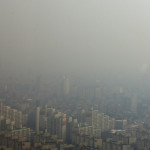 GOVERNANCE AND CIVIL SOCIETY: China, S. Korea and Japan’s Environment Ministers Discuss Joint Response to Air Pollution, Xinhua (29 April 2014)
GOVERNANCE AND CIVIL SOCIETY: China, S. Korea and Japan’s Environment Ministers Discuss Joint Response to Air Pollution, Xinhua (29 April 2014)
The Environment Ministers of China, Japan and the ROK signed a Joint Communique to enhance cooperation on environmental issues and address air pollution in the region. Japan and the ROK have been significantly affected by China pollutants this year, causing the ROK to increase its budget for air monitoring ten-fold over last year. As an added risk factor, research is showing correlation between pollution and suicide rate in Asia and the US.
- Engulfed by China smog, Korea boosts air monitoring spend 10-fold, Cleanbiz.Asia (10 December 2013)
- Japan, South Korea concerned that China’s smog will affect them, Julian Ryall and Audrey Yoo, South China Morning Post (6 November 2013)
- Is air pollution a risk factor for suicide?, John Upton, Pacific Standard (11 April 2014)
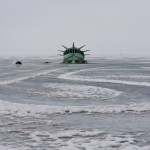 CLIMATE CHANGE ADAPTATION: Stakeholder-Driven Research for Climate Adaptation in New York City (Chapter 4), Nir Y. Krakauer, New Trends in Earth-Science Outreach and Engagement, Advances in Natural and Technological Hazards Research, Springer International Publishing, 2014 [398 KB, PDF]
CLIMATE CHANGE ADAPTATION: Stakeholder-Driven Research for Climate Adaptation in New York City (Chapter 4), Nir Y. Krakauer, New Trends in Earth-Science Outreach and Engagement, Advances in Natural and Technological Hazards Research, Springer International Publishing, 2014 [398 KB, PDF]
New York City’s climate change adaptation trajectory is unusual among global cities in that it has the technical resources to commission science, engineering, and policy research specific to its needs. Through projects (such as those discussed in this article), New York City is leveraging its human capital to make better use of current facilities and regulatory frameworks, providing a potential model for other jurisdictions.
- Cities Lead the Way in Climate Change Action, Cynthia Rosenzweig, William Solecki, Stephen A. Hammer and Shagun Mehrotra, Nature, vol. 467, pp. 909-911 (2010) [0.98 MB, PDF]
- Climate Change Adaptation in New York City: Building a Risk Management Response: New York City Panel on Climate Change, Annals of the New York Academy of Sciences, The New York Academy of Sciences, pp. 1-354, May 2010)
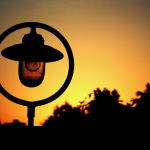 ENERGY SECURITY: Power Hungry, Anilesh S. Mahajan, Business Today, 27 April 2014
ENERGY SECURITY: Power Hungry, Anilesh S. Mahajan, Business Today, 27 April 2014
The power of electricity, the electricity of power, the powerlessness of powerlessness. Indian parliamentary elections may turn on the perception of the “Gujarat model of development” marketed by a champion for the powerful, also invested in electricity and the politics of favors. Pursuit of non-performing zero-carbon assets – nuclear and wind – has made things worse.
- In Tamil Nadu, electricity supply beats corruption, development as main issue, S. Bridget Leena, Mint (23 April 2014)
- Shocking! Link between politics and electricity in India, Hindustan Times (23 April 2014)
- http://www.hindustantimes.com/elections2014/election-beat/lights-out-link-between-politics-and-electricity-in-india/article1-1211522.aspx
- Katiyabaaz, a film. http://www.powerless-film.com/ (2013)
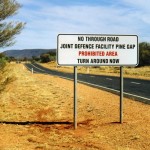 AUSTRAL PEACE AND SECURITY: Malcolm Fraser: An Unlikely Radical, Robert Manne, The Age, 26 April 2014
AUSTRAL PEACE AND SECURITY: Malcolm Fraser: An Unlikely Radical, Robert Manne, The Age, 26 April 2014
‘Dangerous Allies is the most radical book ever to have been written by a former Australian prime minister. Fraser expresses the essence of his policy recommendation in these words: “To make sure that America does not have a capacity to force Australia into a war which we should well and truly keep out of.” Great powers do not reward loyalty; that is the abiding illusion on which our defence policy has been based for more than a century. It’s time for Australia to grow up.’
- Malcolm Fraser calls for closure of Pine Gap Joint Defence Facility, Matt O’Neil, RN Breakfast, ABC Radio National (28 April 2014)
- Dangerous Allies, Malcolm Fraser with Cain Roberts, Melbourne University Press (2014) (e-book and print)
- 5 Philippine bases where the U.S. military will look to gain a footing, Trefor Moss, Southeast Asia Real Time blog, Wall Street Journal (28 April 2014)
The Nautilus Peace and Security Weekly Report presents articles and full length reports each week in six categories: Austral security, nuclear deterrence, energy security, climate change and security, the DPRK, climate change adaptation and governance and civil society. Our team of contributors carefully select items that highlight the links between these themes and the three regions in which our offices are found—North America, Northeast Asia, and the Austral-Asia region.
- Subscribe to NAPSNet to receive free weekly email reports editor:
Contributors:
- Deterrence: Peter Hayes
- Governance and Civil Society: Dyana Mardon
- Climate Change Adaptation: Saleem Janjua
- DPRK: Roger Cavazos
- Austral Peace and Security: Richard Tanter

